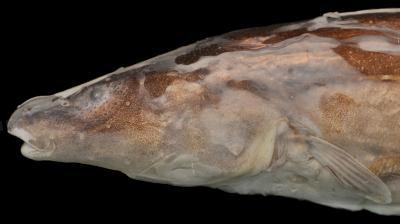Akawaio penak, a previously unknown genus of thin, eel-like electric fish, was discovered in the shallow, murky waters of the upper Mazaruni River is northern Guyana.
University of Toronto Scarborough professor Nathan Lovejoy.
The upper Mazaruni River is a hotspot for biological diversity, yet remains largely unexplored because of its remote location. The area contains countless rivers on top of a series of uplands that have remained isolated from the rest of South America for more than 30 million years.
University of Toronto Scarborough professor Nathan Lovejoy's team analyzed tissue samples collected during a recent expedition by a researchers led by Hernán López-Fernández at the Royal Ontario Museum. By sequencing its DNA and reconstructing an evolutionary tree, Lovejoy's team discovered the fish is so distinct it represents a new genus, the taxonomic classification level above species.

Akawaio penak. Credit: Hernán López-Fernández
"The fact this area is so remote and has been isolated for such a long time means you are quite likely to find new species," says Lovejoy.
Like other electric knifefish, Akawaio penak has a long organ running along the base of the body that produces an electric field. The electric field is too weak to stun prey but is instead used to navigate, detect objects and to communicate with other electric fish. This trait is advantageous given the murky habitats of the fish.

Akawaio penak up close. Credit: Nathan Lujan
The species is named in honour of the Akawaio Amerindians that populate the upper Mazaruni. The region is increasingly suffering from freshwater habitat degradation as a consequence of gold-mining in the area.
"The Mazaruni contains many unique species that aren't found anywhere else in the world. It's an extremely important area in South America in terms of biodiversity," says Lovejoy.
The results of the discovery are published in the recent edition of the journal Zoologica Scripta.

Akawaio penak. Credit: Hernán López-Fernández